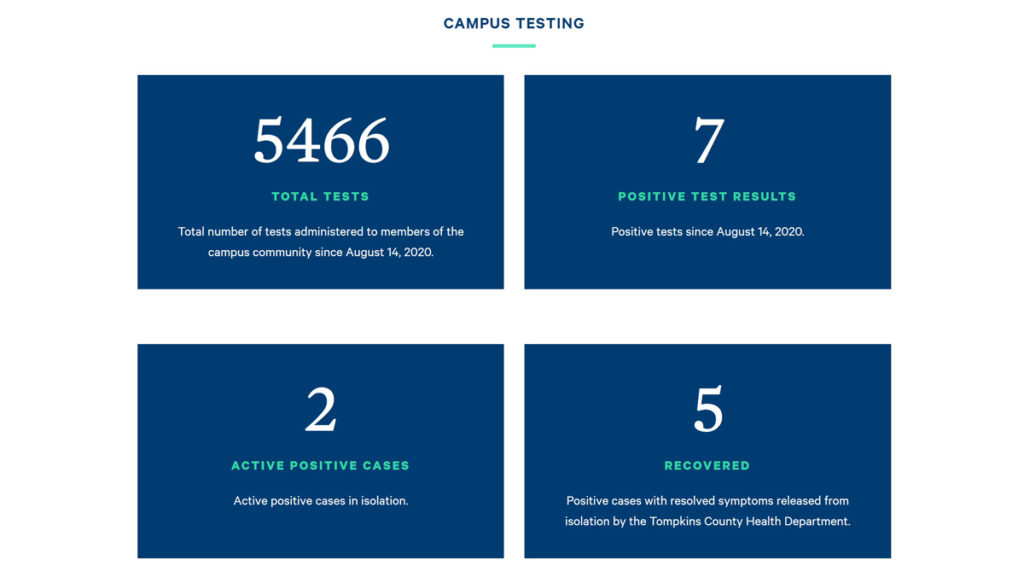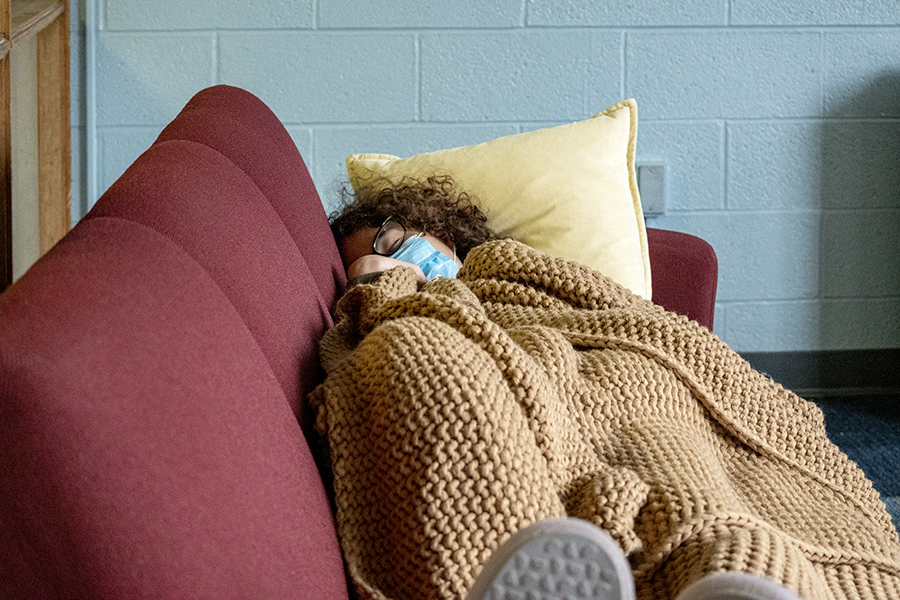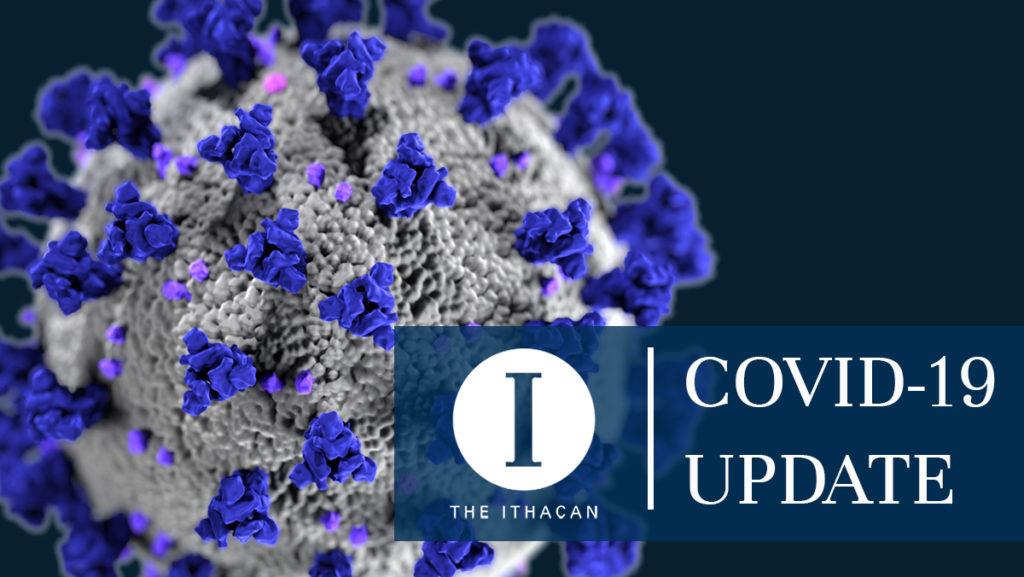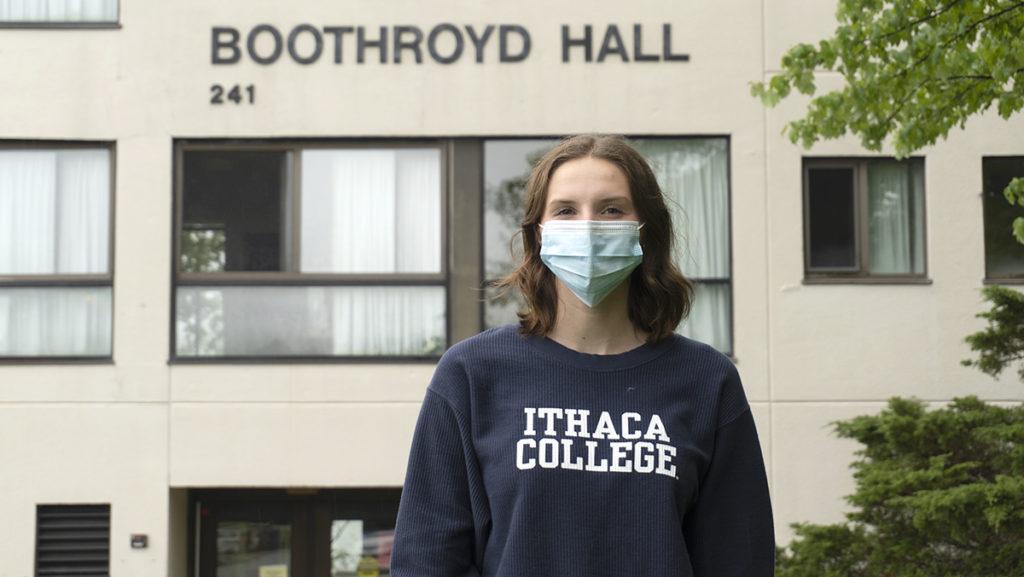Ithaca College launched a COVID-19 dashboard earlier this month, a tool that tracks testing and positive COVID-19 cases at the college.
The college is offering free surveillance testing for students, faculty and staff through Cayuga Health System at the Athletics and Events Center. Testing at The Shops at Ithaca Mall sampling site would cost $99 for nonresidents of Tompkins County who do not meet the testing criteria. Regular testing is required for anyone who is living or working on campus, but people who are off campus are also encouraged to get tested, said Christina Moylan, director of public health emergency preparedness.
Moylan said that the dashboard will be updated on weekdays as data becomes available. The dashboard only includes data since Aug. 14, so it does not include the two members of the college community who tested positive for COVID-19 in the spring.
The college has administered 5,466 tests and had seven positive cases as of Sept. 22, according to the dashboard. There are two active cases in isolation, and five have recovered and were released from isolation by the Tompkins County Health Department. The conducted tests include 378 for on-campus students, 2,605 for off-campus students, 842 for faculty and 1,641 for staff, as of Sept. 24.
Cornell University’s COVID-19 dashboard shows that the university tests over 5,000 people most weekdays. Undergraduate students, faculty and staff at the university are required to be tested twice every week while professional degree students and graduate students are tested once every week. Tompkins Cortland Community College (TC3) has administered 315 COVID-19 tests to date, according to the SUNY COVID-19 tracker.
The health department tracks testing and positive COVID-19 cases in the county but does not distinguish the data from Ithaca College, Cornell or TC3, although this data is included in the county numbers. There have been 148,002 tests conducted in Tompkins County as of Sept. 22.
Samantha Hillson, director of health promotion for the Tompkins County Health Department, said that while the health department does not show data specific to the colleges and university in its dashboard, the site does include links to the Ithaca College and Cornell dashboards.
“The health department is notified about all positive COVID-19 cases in Tompkins County, and we continue to work closely with Ithaca College to navigate the ongoing pandemic,” Hillson said.
Ithaca College’s dashboard does not specify how these individuals contracted COVID-19. Similarly, Tompkins County does not regularly release information about how people have been exposed. Some other counties, like Onondaga County, include possible exposure sources in its COVID-19 data.
The availability of isolation housing on campus is also shown on the college’s dashboard. The college has 100% of its isolation and quarantine rooms available, as of Sept. 22. Emerson Hall is the designated on-campus residence hall for students who have tested positive for COVID-19 or have come into contact with someone who has tested positive to isolate or quarantine in.
The isolation and quarantine rooms are primarily for on-campus students, Moylan said. Off-campus students who have been approved to access campus for academic programs may be able to use the isolation and quarantine housing if the health department determines their off-campus housing is not suited for isolation or quarantine, Moylan said.
Moylan said that students in isolation or quarantine on campus have food delivered by Dining Services, and the Office of Facilities manages sanitation needs. The college has four case managers to work with these students to provide them with other necessities. Moylan said that the Hammond Health Center reaches out to off-campus students to make sure they have someone who is able to deliver daily necessities to them. Eileen Harrington, off-campus living coordinator, will help these students find delivery resources available in Ithaca if necessary, Moylan said.
Moylan said the college decided to have a dashboard so the Ithaca community can see how the college is contributing to the number of tests administered and the number of COVID-19 cases in Tompkins County.
“It is a tool that illustrates the significant impact that the pandemic is having on our community,” Moylan said via email. “It should serve as a constant reminder of our collective goal to maintain health and well-being, which means weekly testing and continuing to adhere to public health recommendations to wear face coverings, use six feet of physical distance and practice good hand hygiene. Even small gatherings where this advice is not followed can lead to rapid disease transmission, which could lead to positive case spikes on the dashboard.”
Junior Kaitlyn Katz is living in Ithaca and said that having information about testing and positive COVID-19 cases at the college is important to her.
“It gives us a good indication on how the school’s doing,” Katz said. “We all need to do our part, and being aware is one of the things to do.”
County demographics in July showed that positive cases were not concentrated among students but rather community members, according to the health department. However, updated demographic data presented Sept. 15 at the Tompkins County Legislature meeting showed an increase of cases among the 10–19 age range. For this age range, the numbers spiked from 6% of the total cases in July to 25% of the total cases. The 20–29 age range also jumped from 30% of the total cases to 36% of the total cases.
“That makes sense when we’re talking about higher education–centered clusters,” said Frank Kruppa, Tompkins County public health director, at the meeting. “What we have found is our clusters have been driven by newer students to higher education, so freshman students that are in that 17, 18, 19 age range.”
Cornell’s dashboard shows there are eight cases of COVID-19 on campus as of Sept. 24. This is a significant drop from earlier in the month when Cornell had two clusters of positive COVID-19 cases. There have been no new positives at TC3 over the last two weeks, according to the SUNY dashboard. TC3 briefly held remote instruction from Sept. 3 to Sept. 11 after six students tested positive for COVID-19.
An account on Twitter called “We Rate COVID Dashboards” gives the COVID-19 dashboards across the country letter grades and suggests improvements. Ithaca College’s dashboard was rated a B+, and the account suggested including information about testing strategy and COVID-19 cases in the surrounding community.
The same Twitter account rated Cornell’s dashboard an A- and suggested that the university include COVID-19 cases in Ithaca, information about the testing lag times and the testing plan. Cornell’s data does not always correspond with the health department’s data because it is not updated as frequently. The site contains a disclaimer that it may take up to two days for test results to be reflected in the data.
Ithaca College senior Jess Scarano, who is living off campus in Ithaca, said she is hoping other students who returned to Ithaca will help the community keep its number of COVID-19 cases low.
“Since we are still in the middle of a global pandemic, I believe that it is both respectful and urgent for all students coming back to Ithaca to follow the necessary safety precautions,” Scarano said.
Testing at the college is available for students, faculty and staff from 8 a.m. to 4 p.m. Tuesdays and Wednesdays, but people who are symptomatic must be tested at The Shops at Ithaca Mall sampling site.












